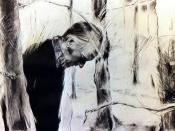Although Thomas Bernhard's reputation as a major writer has become increasingly well established in the United States, the thematic and stylistic difficulties of his prose are still not likely to gain for him a wide readership. This translation of his five autobiographical sketches, which were published separately in German between 1975 and 1982, should make his novels and plays more accessible by providing a personal and historical context for the persistent Bernhardian themes of suffering, disease, death, despair, isolation, and suicide. Bernhard's recollections of the first nineteen years of his life are by no means an unrelentingly grim account of childhood suffering. Rather, he tells his story with remarkable detachment, even humor, most notably in A Child, the last of the five autobiographical books to appear in German (following chronology, it is placed first in the translation). The fascination which emanates from these works stems from the enormous contrasts and paradoxes of Bernhard's record of his life.
It is the story of a continual overcoming of pain, of the struggle to transform suffering into meaningful endeavor and, eventually, into literature. Written in a gripping style and with considerable polemic energy, Gathering Evidence is a work of piercing honesty and integrity.
Each of the five books begins by focusing on a decisive moment in Bernhard's life. This initial focus, already suggested by the title of the books (A Child, An Indication of the Cause, The Cellar: An Escape, Breath: A Decision, In the ColdÃÂDavid McLintock, it should be noted, takes some liberty in translating the titles as well as the body of the text), is then varied at length. A Child opens with the story of an illicit bike ride from Traunstein in Upper Bavaria, where the young Bernhard lived with his mother and guardian, to his Aunt Fanny's house,



Gathering Evidence: A Memoir
This essay was a very good description of Bernhard's life. Well done.
0 out of 0 people found this comment useful.